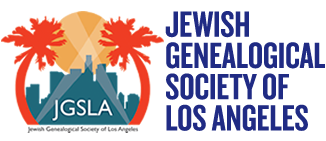Beshert, by Barbara Algaze
I am an amateur genealogist and I volunteer at the Los Angeles Branch of the Family History Library. My name is Barbara Algaze and this is my story.
I belong to GerSIG, a genealogical forum. One day a German man, who works in the courthouse in Berlin, posted a message indicating that he was volunteering to look for copies of Last Wills for anyone who believed their ancestors might have filed one in Berlin in the early 1900s. I started an e-mail contact with him and gave him information about my grandfather, who died in Berlin in 1931. My correspondent wrote back, telling me that my grandparents had written and filed a will in the Charlottenburg section of Berlin in January of 1918. He gave me the reference number and the address to write to, and I subsequently wrote to them and received a copy of this most valuable document. My contact also had access to a number of other documents, and sent me interesting information about other members of my family, which I greatly appreciated. Then our correspondence stopped.
A couple of months later, he wrote and asked me for a favor. He was looking for members of a Jewish family, whose last address was in West Los Angeles, California, a short three miles from my own home. There was Emma, the mother (who died in 1966), Georg, the son (who died in 1985), and Lotte, the wife (who died in 1987). Since he had been so helpful to me, I really wanted to help him out, but there were 122 listings for the surname he had given me, and that was in the West Los Angeles directory alone—not counting Downtown, or the Valley!
We went back and forth, via e-mail, trying to figure out how to best locate the descendants of this family. He never told me why he was looking for this family and I never asked. It was a real genealogical challenge. I finally decided to call the Jewish cemeteries in the area to find out if these individuals were buried in any one of them. Once I could locate their final resting places, perhaps I could ask at the cemetery office if they had any names of descendants I could contact. (I had once used this method to find a living descendant of an ancestor I had found buried in a New York cemetery, to great success.) However, before I could get around to making the telephone calls, I was scheduled to go to the FHC for my volunteer work. Once there, I found myself at the information desk, with not much to do. In these instances, I usually start rummaging through the Lost and Found box to see if I can locate the owners of the materials that I find there.
I often become extremely upset when I see what kinds of documents, papers, data, newspaper articles, and even valuable photos are inadvertently left behind by patrons of the library. I spend a great deal of time going through the items in an attempt to locate a name, address, or telephone number in order to get them back to their owners. On this particular day, I found some papers that had a name and telephone number attached to them. I copied down the information and took it home with me. When I made the telephone call that evening, I reached Eva who was so grateful that I found her items. She told me that she had been “…looking all over the house, even took the car apart…” to find those papers. She never thought that she might have left them at the library. As I was talking to her on the telephone, I noticed that Eva’s surname was the same as that of the family that was the object of my GerSig correspondent’s search. The chance that she would be related was miniscule, but I figured, it couldn’t hurt to ask. You can probably guess the rest. Eva just happened to be the granddaughter of Emma, and the daughter of Georg and Lotte.
When I told her the story, she was quite apprehensive; why was a court employee in Berlin looking for her? It turned out that her great uncle had owned a piece of real estate in a part of East Berlin that had been “behind the wall” for all these years. No one from her family (not even her father, the nephew) knew about this possession. Now that the city was reunited, someone was trying to sell the property, and in the process had discovered that the property had been taken away from her uncle by the Nazis and turned over to a non- Jewish owner. Now they were trying to locate a descendant in order to return the property to the rightful heirs. In Yiddish, the term beshert means, “It was meant to be.” Somehow, I believe that it was beshert that I was at the information desk that day looking through the Lost and Found for misplaced documents. If someone else had taken on that task, this connection would never have been made. In addition, if I had located the documents the week before my correspondent had called me, I never would have made the connection between the surname he was looking for and Eva’s last name.
I guess the connection was “meant to be.” You never know where you will find connections.
